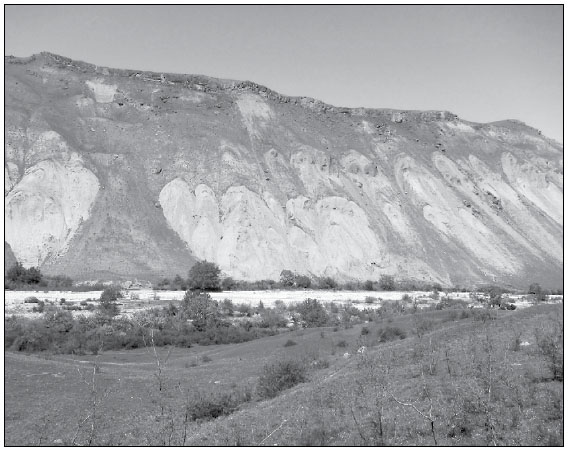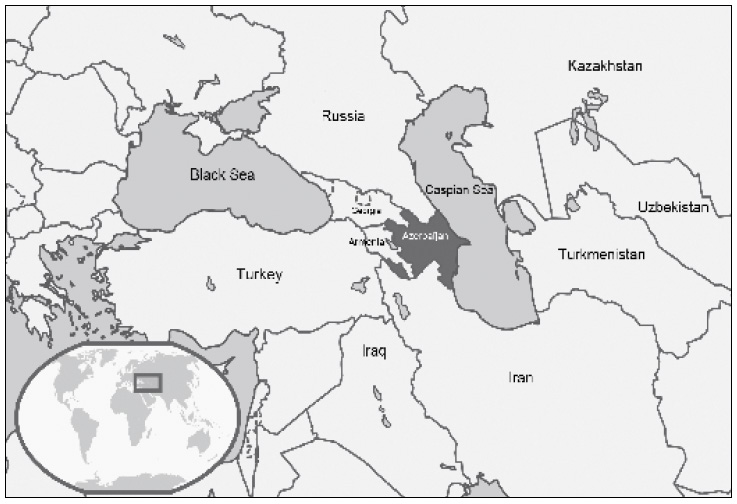Impressions – Azerbaijan in the spring of 2017
Impressions – Azerbaijan in the spring of 2017
by Barbara Hug
A small country, nestled in between Great Power Russia and Iran, confined by the Caspian Sea, on the verge of a permanent conflict with its Western neighbour Armenia – the Nagorno-Karabakh conflict – a small stretch of border with Georgia: this is the geostrategic position Azerbaijan presents itself in. Due to its richness in oil, the former Soviet Republic was both a target of Hitler as well as Britain.
Today, for the most part, oil extraction takes place offshore, although there are still some small oil pumps stoically continuing on in the steppes. Natural gas is found close to the surface and winning it is not too costly. A couple of years ago, Switzerland negotiated trade agreements regarding the sought after energy resource with SOCAR as well. Oil shaped the steppes and the mountain landscape. Glittering Baku may not be to everyone’s taste. The ostentatiously displayed riches make it easy to guess who the real profiteers of the oil boom are.
Some distance away from the capital, one gets acquainted with quiet, rural regions whose population enjoys but a very low standard of living. In the mountainous highlands, herds of goats and cows provide the livelihood. Time and again, small facilities for fish farming emerge, with the necessary water being diverted from the swelling rivers of Caucasus. Bricks of moist clay and hay are preformed in wooden molds and dried in the sun.
Proud to be Azerbaijani
That way, every village is capable of producing its own bricks. In the mountains, where wood is a scarce resource, dried cow and sheep manure is used as heating material. In Caucasus as well as in the regions situated in the Talish Mountains to the South bordering Iran, in isolated Zuvand, the friendliness of the poor mountain farmers is overwhelming. One is proud to be Azerbaijani. Unfortunately, since the 1990s, students in school are taught English instead of Russian which could possibly alienate them from the older generation. However, it is not noticeable yet.
On the contrary: family provides the centre of daily life, older people are highly respected, children are well protected and emotionally integrated, be it while shepherding the sheep out to the pasture with the father or at home with the mother. Usually, the children are accompanied to school by their father or they go in groups of three or four other children, all without screaming, brawling or bullying. Xinaliq, a mountain village situated at 2,300 metres above sea level, has a population of 2,000, 300 of which are school children.
The Russian government has established a “green corridor” that – reminiscent of conditions in the former USSR – guarantees the steady export of vegetables and fruits to Russia. Strawberries, apples, spring onions, parsley and the mountain tea – Azerçay – are of exquisite quality. The vast improvement of relations between the countries is palpable. Russian truck convoys make their way into Iran, Iranian trucks drive north. Azerbaijan is a friend of Turkey. Should Turkey join the Eurasian Union or strive to have a longlasting strategic partnership with Russia, Azerbaijan would be affected too.
Occasionally, a slight indignation towards Europe rears its head
Occasionally, a slight indignation towards Europe rears its head, as was the case with the recent treatment of Turkey. Let’s let Rafig Aliyev speak. He’s the founder of the Centre for Islamic Studies and a member of the World Peace Academy within the International Interreligious Committee. In his 2011 book “New Europe without Capitalism”, he analyses Europe’s failure, a failure brought upon by a completely out of control capitalist system: Western as well as Eastern Europe were taken hostage by the false selection of a liberal economic model. The caring way of balancing out injustice was abandoned. Europe has been plunged into a deep crisis and so far, it has not found a way out of it. Rafig Aliyev expects social changes as well as very hard times for Europe. There are – of course – unsettling ways to deal with the crisis as well, such as embroiling European nations in regional wars. According to his historic experience, politicians start wars in order to maintain their power whenever they have run out of means to establish peace. Europe, he alleges, is rich in its intellect, despite not using it.
Azerbaijan protects its society and its borders by extraordinary vigilance. Every attempt to infiltrate by supposedly religious extremist groups has – until now – been thwarted. Acts of sabotage against bridges or barrages are sought to be prevented by a strong, sustained building surveillance. They want to know exactly who and what the “tourist” is. Which, in turn, guarantees his safety. •
bha. The system of Islamic banking is not practised in Azerbaijan. Islamic banking might eventually create a social balance between the social classes.
Basis of Islamic banking are the Koran and its interpretation by Muslim scholars. Among the basic principles is the prohibition on interest, as it was the case for the Catholic Church up to 1986, the prohibition of speculation and the prohibition of gambling-like transactions. Islamic banking is also intended to strengthen people with small deposits and to allow no influence from the surrounding society. These principles make them resistant to crashes. The prohibition of interest does not allow extreme accumulation of funds.
bha. Supporters of the Peak oil theory call the petroleum “fossil fuel”, Ukrainian scientists such as Krajuschkin, showed that oil from greater depths does not have a fossil but an abiotic origin. Without the findings of Ukrainian scientists to abiotic petroleum any discussion of new energy sources is only half the story. It leads to nowhere. This is known in Azerbaijan.

